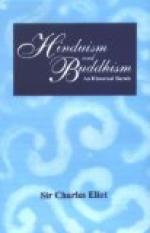The story has been criticized as an obvious legend, but I see no reason why it should not be true to this extent that Ming-Ti sent an embassy to Central Asia (not India in our sense) with the result that a monastery was for the first time established under imperial patronage. The gravest objection is that before the campaigns of Pan Ch’ao,[597] which began about 73 A.D., Central Asia was in rebellion against China. But those campaigns show that the Chinese Court was occupied with Central Asian questions and to send envoys to enquire about religion may have been politically advantageous, for they could obtain information without asserting or abandoning China’s claims to sovereignty. The story does not state that there was no Buddhism in China before 62 A.D. On the contrary it implies that though it was not sufficiently conspicuous to be known to the Emperor, yet there was no difficulty in obtaining information about it and other facts support the idea that it began to enter China at least half a century earlier. The negotiations of Chang Ch’ien[598] with the Yueh Chih (129-119 B.C.) and the documents discovered by Stein in the ancient military posts on the western frontier of Kansu[599] prove that China had communication with Central Asia, but neither the accounts of Chang Ch’ien’s journeys nor the documents contain any allusion to Buddhism. In 121 B.C. the Annals relate that “a golden man” was captured from the Hsiung-nu but, even if it was an image of Buddha, the incident had no consequences. More important is a notice in the Wei-lueh which gives a brief account of the Buddha’s birth and states that in the year 2 B.C. an ambassador sent by the Emperor Ai to the court of the Yueh Chih was instructed in Buddhism by order of their king.[600] Also the Later Han Annals intimate that in 65 A.D. the Prince of Ch’u[601] was a Buddhist and that there were Sramanas and Upasakas in his territory.
The author of the Wei-lueh comments on the resemblance of Buddhist writings to the work of Lao-tzu, and suggests that the latter left China in order to teach in India. This theory found many advocates among the Taoists, but is not likely to commend itself to European scholars. Less improbable is a view held by many Chinese critics[602] and apparently first mentioned in the Sui annals, namely, that Buddhism was introduced into China at an early date but was exterminated by the Emperor Shih Huang Ti (221-206) in the course of his crusade against literature. But this view is not supported by any details and is open to the general objection that intercourse between China and India via Central Asia before 200 B.C. is not only unproved but improbable.




